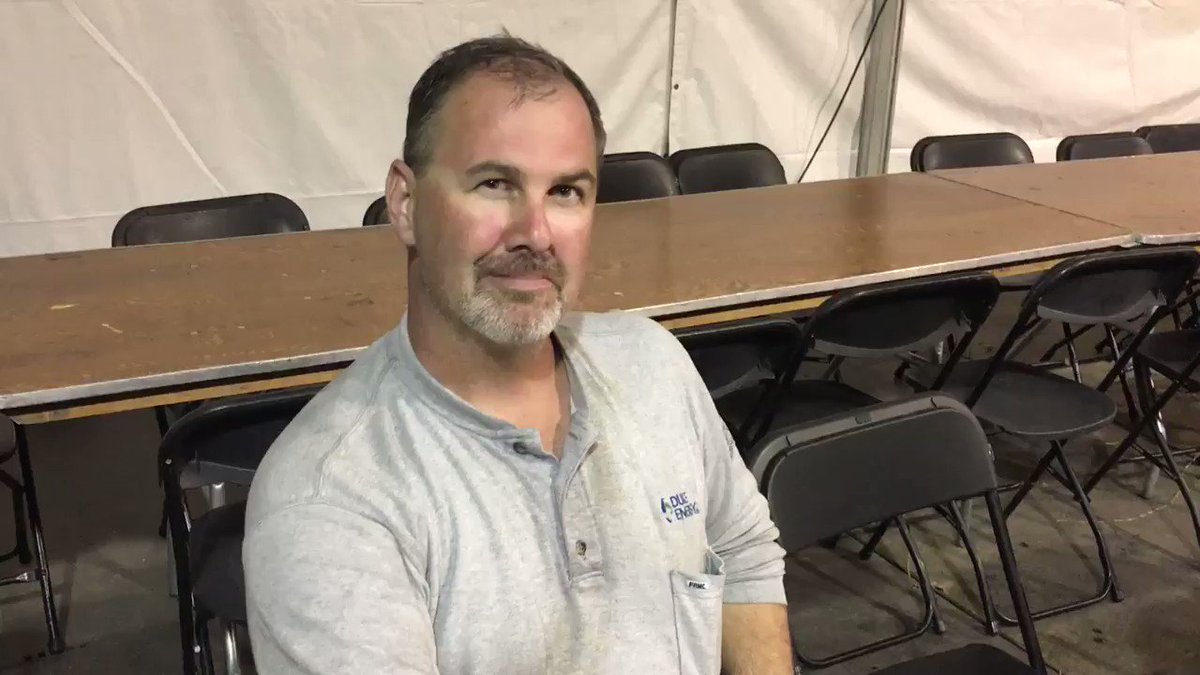Vox
GOP senators are rushing to pass Graham-Cassidy. We asked 9 to explain what it does.
by Jeff Stein September 20, 2017
 “You have to have a car to get into, and this is the only car there is,” Sen. Pat Roberts (R-KS) said. Photo by Chip Somodevilla/Getty Images
“You have to have a car to get into, and this is the only car there is,” Sen. Pat Roberts (R-KS) said. Photo by Chip Somodevilla/Getty Images
Republican senators are struggling to articulate why they are rushing to pass their last-ditch effort to repeal and replace Obamacare over the next 10 days before running into their September 30 deadline.
In interviews with Vox on Tuesday, nine Republican senators primarily argued that their “Hail Mary” bill — spearheaded by Sens. Lindsey Graham (SC) and Bill Cassidy (LA) — would return federal power to the states, giving them greater flexibility to improve their health systems locally. “The heart of the legislation takes the policymaking role of Washington and sends it to the states,” Texas Sen. Ted Cruz said.
Far less clear is exactly how Graham-Cassidy would pull off this feat without resulting in millions of Americans losing their insurance — and the number of millions is still unknown, since any vote would likely have to come before the Congressional Budget Office completes its analysis of the bill. The GOP senators insisted that the tens of billions in cuts to federal health spending proposed in the bill would not result in coverage losses because, they said, the states would have more flexibility.
“They can do it with less money,” said Sen. Jim Inhofe (R-OK), who was unable to explain how or why.
Other Republican senators, meanwhile, fell back on political explanations for a bill that experts warn could result in millions losing their insurance. “If we do nothing, it has a tremendous impact on the 2018 elections,” said Sen. Pat Roberts (R-KS). “And whether or not Republicans still maintain control and we have the gavel.”
And then some members of the upper chamber acknowledged that the spending changes might have a big impact, but argued their home states would not be negatively impacted. “Four of our states are getting a disproportionate amount of money from health care now,” Sen. Richard Shelby (R-AL) said. The bill, he added, “wouldn’t cut Alabama.” (Numbers from the Center on Budget and Policy Priorities suggest Alabama would receive more than $1 billion in additional funding under the bill, but most states would see big cuts.)
The stakes of the Republican rush to repeal and replace Obamacare could hardly be higher. The GOP has less than two weeks to pass a repeal-and-replace plan before their budget reconciliation instructions expire, and the insurance of tens of millions of Americans hangs in the balance.
Vox conducted the interviews with nine Republican senators throughout the Capitol and Russell Senate Office Building on Tuesday.
Transcripts of those conversations follow.
Sen. Pat Roberts (R-KS): “If we do nothing, it has a tremendous impact on the 2018 elections”
 Pat Roberts, right, of Kansas. Photo by Win McNamee/Getty Images
Pat Roberts, right, of Kansas. Photo by Win McNamee/Getty Images
Jeff Stein
Senator, I wanted to ask you for a policy-based explanation for why you’re moving forward with the Graham-Cassidy proposal. What problems will this solve in the health care system?
Pat Roberts
That — that is the last stage out of Dodge City.
Jeff Stein
I’m just trying to explain to our readers what the policy —
Pat Roberts
What readers? Who do you represent?
Jeff Stein
It’s a website called Vox.
Pat Roberts
… [Graham-Cassidy] is the last stage out of Dodge City. I’m from Dodge City. So it’s the last stage out to do anything. Restoring decision-making back to the states is always a good idea, but this is not the best possible bill — this is the best bill possible under the circumstances.
If we do nothing, I think it has a tremendous impact on the 2018 elections. And whether or not Republicans still maintain control and we have the gavel.
Jeff Stein
But why does this bill make things better for Americans? How does it help?
Pat Roberts
Pardon me?
Jeff Stein
Why does this make things better? What is this doing?
Pat Roberts
Look, we’re in the back seat of a convertible being driven by Thelma and Louise, and we’re headed toward the canyon. That’s a movie that you’ve probably never seen —
Jeff Stein
I do know Thelma & Louise, sir.
Pat Roberts
So we have to get out of the car, and you have to have a car to get into, and this is the only car there is.
Sen. Jim Inhofe (R-OK): “Efficiencies” from federal-state transfer “can very well make up the difference”
 Jim Inhofe. Photo by Chip Somodevilla/Getty Images
Jim Inhofe. Photo by Chip Somodevilla/Getty Images
Jeff Stein
What’s the policy explanation for the Graham-Cassidy bill? What substantive problems does this solve?
Jim Inhofe
Well, first of all, as a general rule the states do things better than the federal government does [things]. And that is essentially what the bill is. We actually had a bill that passed, except at the last minute — as you know — we had one deciding vote against it that was unforeseen. And I think what we’re looking at right now is essentially the same thing.
It’s a stronger position for the states to be in, and generally, Republicans agree with that.
Jeff Stein
I understand what you’re saying with the states having the ability to make these decisions, but the bill doesn’t just “give states more freedom” — it also cuts federal funding to the states. So it’s not just about giving the states more control; it’s also about cutting federal expenditures, right?
Jim Inhofe
Well, yes, but that doesn’t mean it’s going to be — I think the efficiencies that come with transferring the funding to the states can very well make up the difference between what the federal thing would be.
A philosophical difference — you know?
Jeff Stein
No, what do you mean?
Jim Inhofe
I mean it’s more efficient when it’s done from the states, and so they can do it with less money.
Jeff Stein
Are you confident, and how do you know those savings will be close to enough to protect everyone?
Jim Inhofe
Well, nothing protects everyone.
Sen. Ted Cruz (R-TX): “It lets states innovate and adopt creative solutions”
 Photo by Alex Wong/Getty Images
Photo by Alex Wong/Getty Images
Jeff Stein
I’m looking for a broad policy explanation for what Graham-Cassidy will do — how does it improve the American health care system?
Ted Cruz
Well, the details of it are still being negotiated, but the heart of the legislation takes the policymaking role of Washington and sends it to the states. It lets states innovate and adopt creative solutions to local problems, which vary state by state.
Jeff Stein
But it’s not just devolving power from the federal government to the state. It also involves a 16 percent cut in federal spending [upfront] and a 34 percent cut over the next 10 years.
If you’re saying, “Let’s just devolve power to the states,” why also cut federal spending so dramatically?
Ted Cruz
My central focus from the beginning has been on lowering health insurance premiums.
The biggest reason so many millions of people are hurting under Obamacare is that it has made premiums skyrocket. And what I think is critical for Obamacare repeal is that we expand consumer freedom so that you, the consumer, can be in charge of what health insurance you want to buy, and we lower premiums so that health insurance is more affordable.
Jeff Stein
Why not wait until the CBO says what you’re saying about premiums? Why not confirm with them? Over the first few votes, the CBO suggested that premiums would go up and that tens of millions of people would lose health insurance.
Ted Cruz
CBO’s analysis throughout this process has been ridiculously slow, unreliable, and based on policy assumptions that are demonstrably false.
Jeff Stein
You really believe that cutting federal spending by 34 percent will not result in any other people losing their insurance?
Ted Cruz
What federal spending is cut?
Jeff Stein
Well, the Medicaid expansion would be sunset, for one, is my understanding.
Ted Cruz
The decrease in future rates of growth is not a cut. And it is only in the bizarre world of Washington that billions more money is characterized in the press as a cut rather than an increase, which is in fact what it is.
Sen. John Kennedy (R-LA): “Read the bill and you’ll understand”
 John Kennedy. Jonathan Bachman / Stringer / Getty Images
John Kennedy. Jonathan Bachman / Stringer / Getty Images
Jeff Stein
What are the policy explanations for the bill?
John Kennedy
I think it’s an improvement over Obamacare, but I have sent four amendments to Lindsey [Graham] and Bill [Cassidy] that I think will strengthen the bill. The one I feel most strongly about is that I want the Medicaid work requirement — I don’t want it to be optional; I want it to be a requirement. Just like we did with welfare reform.
And number two, I want to get us to give guardrails to the states to say, “You cannot use these moneys to set up a state-run single-payer system.” I don’t believe in it. I think it’s a mistake.
I’ve lived under a single-payer system, and I think the bill would be stronger with that prohibition. [That’s an apparent reference to England, where Kennedy received a law degree in the 1970s and which has the National Health Service.]
[Guardian reporter] Lauren Gambino
Do you think that kind of goes against the idea of states’ rights and being able to use this money [as the states want to]?
John Kennedy
No, no. We have plenty of federal rules that apply to every state, but we still agree with states’ rights.
Jeff Stein
What are the main policy explanations for getting behind this bill? What does this bill do right, policy-wise?
John Kennedy
I think it’s an improvement over Obamacare.
Jeff Stein
Why?
John Kennedy
My position has always been that, number one, I think Obamacare has been a failure.
Number two: First chance I get to vote for repeal it, I’ll do it.
And number three: If it’s replacement, if replacement is better than Obamacare, I will vote for it.
Jeff Stein
What are the policies that make you think that?
John Kennedy
I think it spends scarce resources in a more rational manner. It will control costs. I like the idea that it encourages states to innovate.
Jeff Stein
How does it do that? Any of those things?
John Kennedy
Well, you need to read the bill.
Jeff Stein
Well, you’re voting for it, right? So what is the explanation for how it does those things?
John Kennedy
I am. Because it gives states added flexibility. Read the bill and you’ll understand.
Sen. Richard Shelby (R-AL): “It wouldn’t cut Alabama, though”
 Richard Shelby, right Photo by Alex Wong/Getty Images
Richard Shelby, right Photo by Alex Wong/Getty Images
Jeff Stein
In broad strokes, what do you think this bill is going to accomplish?
Richard Shelby
This is what a lot of us ran on — we’ve been advocating it for years. Let the states run it. They know more about it. They run the Medicaid program. They run our highway programs. We send 80 percent of money to various transit and highway stations — there, where the rubber hits the road.
Jeff Stein
But it’s not just that it devolves power to the states — it also involves a 16 percent cut in federal health spending.
Richard Shelby
But I’ll tell you what: Our states — our 50 states — are very flexible, very innovative. Much more so than we are here. I think it will work, and it will be a big step toward federalism.
Jeff Stein
The bill would cut federal funding to states by 34 percent over the next —
Richard Shelby
But it wouldn’t cut Alabama, though.
Jeff Stein
Well, do you think the other states should deal with —
Richard Shelby
Well, you see some of our states, four of our states, are getting a disproportionate amount of money from health care now. You know which ones.
Sen. Johnny Isakson (R-GA): “I don’t know what the numbers are going to end up looking like”
 Johnny Isakson, right. Photo by Chip Somodevilla/Getty Images
Johnny Isakson, right. Photo by Chip Somodevilla/Getty Images
Jeff Stein
What is the policy explanation for the Graham-Cassidy health care bill?
Johnny Isakson
Policy explanation? I’m not into policy, so I don’t really know. I’m into facts.
Jeff Stein
[In a follow-up interview hours later on Tuesday] You were joking earlier, but what is the health policy in the Graham-Cassidy proposal that you like?
Johnny Isakson
More state innovation. More input from the states.
Jeff Stein
What does that mean, exactly?
Johnny Isakson
The governors — I’m from a state that didn’t expand Medicaid, and the way we were going in health care looked like those states would actually be hurt worse than other states.
By going to block grants, back to the states, the control of money stays with the states, and you have less [un]predictability and external deviation in terms of funding.
Jeff Stein
So just a follow-up on that. It’s one thing to say the bill gives the states power — that’s one thing.
But it doesn’t just do that. It also cuts the money they have — some estimates say around 16 percent of federal funding.
Johnny Isakson
I’m not going to confirm that statement one way or another. I don’t know what the numbers are going to end up looking like.
Jeff Stein
Right, but if it does cut federal spending overall, would you support it?
Johnny Isakson
You know, those are dangerous questions. I’m waiting until I see the totality of the legislation to say whether I support the whole thing or not, anyway.
I’m not a no, but I’m not a yes either — and I’m waiting for my governor to respond to me with their input as well. It’s really key what they’re doing.
Sen. John Barrasso (R-WY): “The governors who decided to expand [Medicaid] knew that they were going to lose federal funding”
 John Barrasso. Photo by Chip Somodevilla/Getty Images
John Barrasso. Photo by Chip Somodevilla/Getty Images
Jeff Stein
I want to ask, in a big-picture way: What is the policy explanation for how this bill makes people’s lives better?
John Barrasso
It gets the money out of Washington, lets people at home make the decision, and gets state legislatures involved, and governors involved. It moves money out of Washington. It’s away from socialism.
Jeff Stein
CBPP says it will also reduce federal health spending on Medicaid and the exchanges by about [20] percent.
John Barrasso
I’d love to reduce federal spending on health insurance.
Jeff Stein
Right, but so it’s not just about moving power to the states — it’s also about cutting funding.
John Barrasso
It’s about moving power to the states, where money can be spent much more effectively.
Jeff Stein
How does it do that?
John Barrasso
Well, you have to read the formula and read the bill, and it will tell you how it moves money to the states and how much they get and how much they don’t get. …
Jeff Stein
There’s a concern from Republican governors who have come out and said, “This is too dramatic a cut in spending; we won’t have enough money to insure everyone.”
John Barrasso
You have to interview them on that.
Jeff Stein
Do you think they’re wrong?
John Barrasso
Well, it depends on if they’re states that expanded Medicaid or not. …
Jeff Stein
In the Medicaid expansion states, they still have a lot of people who rely on Medicaid expansion for health insurance.
John Barrasso
I opposed Medicaid expansion. I think the Supreme Court got it wrong [when it ruled in 2012 that Congress did have the constitutional authority to implement most of Obamacare].
The governors who decided to expand [Medicaid] knew that they were going to lose federal funding over time, and they’re objecting to that — but they knew it. You could say, “Some of them didn’t understand it, and so-and-so wasn’t there, and he wasn’t governor yet,” but they understood that this would be part of the process. So if they used the money poorly —
And my concern with Medicaid is that the people who Medicaid was designed for originally have been cut out of the process, because they’re still on the waiting list to get on Medicaid. I don’t know how much you understand about Medicaid, but this whole expansion of Medicaid went for healthy, working-age individuals — it did not go for the people who [Medicaid] was designed for, which was low-income women, children, and the disabled.
Sen. Luther Strange (R-AL): “I like the idea of sending money back to the states and letting the states experiment”
 Luther Strange. Photo by Win McNamee/Getty Images
Luther Strange. Photo by Win McNamee/Getty Images
Jeff Stein
I had a quick question on the Graham-Cassidy bill — could you explain what the policy purpose of the bill is? What is this bill going to achieve, policy-wise?
Luther Strange
Honestly, I have a meeting to talk about that shortly — so let me get back to you on that shortly. I have to talk to my staff.
Jeff Stein
[In a follow-up conversation with Strange about eight hours later]
So what do you think?
Luther Strange
We’re still looking at the details on how it affects Alabama, so we haven’t taken a position on it yet.
I like the idea of sending money back to the states and letting each state experiment with what’s best for their citizens. But I haven’t seen enough detail to know how it affects Alabama to have taken a position on it.
Jeff Stein
Do you worry about the billions in cuts in federal health care expenditures?
Luther Strange
That’s the kind of detail I haven’t seen on how it would affect our state.
Jeff Stein
Anything in particular you’ll be looking for?
Luther Strange
How it affects the state of Alabama, and how we are treated as a non-expansion state.
Jeff Stein
Will you be looking for protections for those with pre-existing conditions? What else matters?
Luther Strange
All of the above.
Sen. Chuck Grassley (R-IA): “This is the last attempt to do what we promised in the election”
 Photo by Alex Wong/Getty Images
Photo by Alex Wong/Getty Images
Jeff Stein
I was hoping you could explain, in broad detail, what the point of Graham-Cassidy is.
Chuck Grassley
Let me give you a political answer, and then I’ll give you a substance answer.
The political answer is that Republicans have promised for seven years that we were going to correct all the things that were wrong with Obamacare, and we failed the first eight months. This is the last attempt to do what we promised in the election.
The substance answer is that Obamacare starts with the principle that all knowledge about health care, and all decisions on health care, ought to rest in Washington, DC. The complete opposite of that is Graham-Cassidy, that Washington doesn’t know best and we’ll let each of the 50 states [decide what’s best].
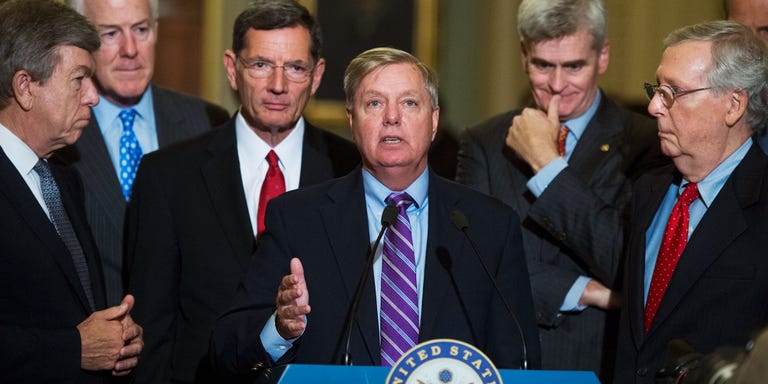 Getty
Getty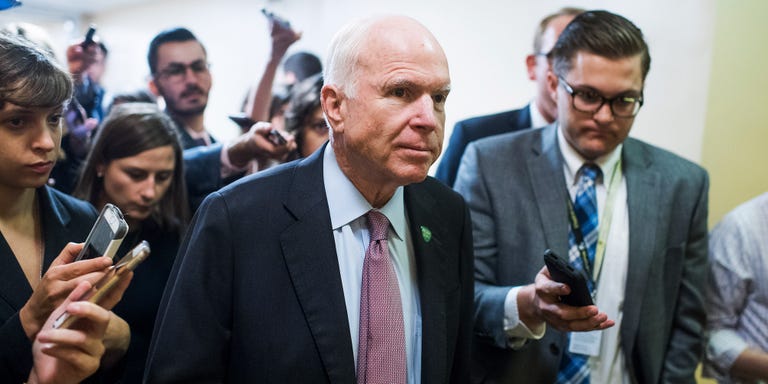 Getty
Getty
 “You have to have a car to get into, and this is the only car there is,” Sen. Pat Roberts (R-KS) said. Photo by Chip Somodevilla/Getty Images
“You have to have a car to get into, and this is the only car there is,” Sen. Pat Roberts (R-KS) said. Photo by Chip Somodevilla/Getty Images Pat Roberts, right, of Kansas. Photo by Win McNamee/Getty Images
Pat Roberts, right, of Kansas. Photo by Win McNamee/Getty Images Jim Inhofe. Photo by Chip Somodevilla/Getty Images
Jim Inhofe. Photo by Chip Somodevilla/Getty Images Photo by Alex Wong/Getty Images
Photo by Alex Wong/Getty Images John Kennedy. Jonathan Bachman / Stringer / Getty Images
John Kennedy. Jonathan Bachman / Stringer / Getty Images Richard Shelby, right Photo by Alex Wong/Getty Images
Richard Shelby, right Photo by Alex Wong/Getty Images Johnny Isakson, right. Photo by Chip Somodevilla/Getty Images
Johnny Isakson, right. Photo by Chip Somodevilla/Getty Images John Barrasso. Photo by Chip Somodevilla/Getty Images
John Barrasso. Photo by Chip Somodevilla/Getty Images Luther Strange. Photo by Win McNamee/Getty Images
Luther Strange. Photo by Win McNamee/Getty Images Photo by Alex Wong/Getty Images
Photo by Alex Wong/Getty Images
 Petrobras oil refinery plant in Pasadena, Texas. (CREDIT: AP Photo/Frank Bajak)
Petrobras oil refinery plant in Pasadena, Texas. (CREDIT: AP Photo/Frank Bajak)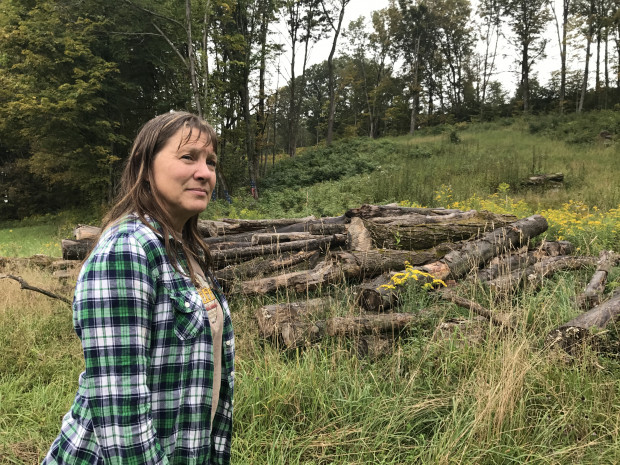 Marie Cusick / StateImpact Pennsylvania
Marie Cusick / StateImpact Pennsylvania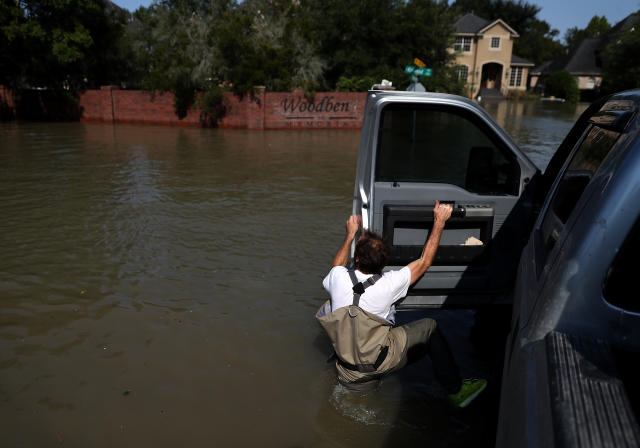

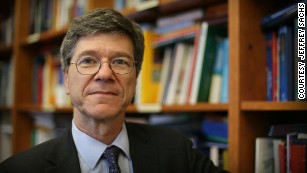
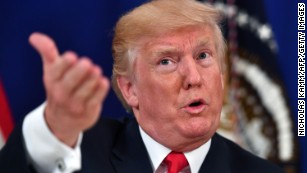

 Photo: Getty Images
Photo: Getty Images